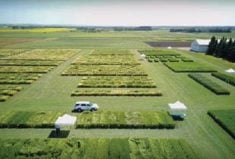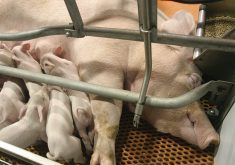When defending agriculture’s social licence to operate, stop making excuses and start raising the bar.
“It amounts to excuses — the stories we tell ourselves,” said Mark Bosworth, a leadership consultant at KESA, an Alberta company with clients ranging from businesses and government agencies to NHL teams.
He cited a number of common responses when some aspect of farming is criticized: ‘Nobody told me, I don’t know anything about it.’ ‘I’m just following the rules.’ ‘What can I do, it’s really out of my control.’ ‘Nothing I could do would ever make a difference.’ ‘We aren’t getting enough support.’ ‘People expect too much of us.’ ‘The Americans aren’t doing it.’ ‘The government is out of touch.’ ‘It’s just a fad.’
Read Also

Farming Smarter receives financial boost from Alberta government for potato research
Farming Smarter near Lethbridge got a boost to its research equipment, thanks to the Alberta government’s increase in funding for research associations.
“Sometimes, these things are true, but sometimes, we get stuck,” he said.
And beneath the surface of those stories is fear, Bosworth said at the Alberta Pork AGM last month.
“It goes right back to our childhood — ‘I’m going to get a whupping, so I better tell a story.’ We use these sandbags of excuses to protect ourselves,” he said. “But though the fear can be very real, it doesn’t have us thinking rationally.”
Fear is the “enemy” of quality, said Bosworth.
“If you have fear in your farm, your operation, or your organization, low quality will follow.”
With these fear-based excuses, there’s a tendency to aim low, he added.
“It’s like the old saying goes, ‘If you want to guarantee success, set a low bar.’ But the outcomes are, frankly, unproductive,” said Bosworth. “We hit barriers and face challenges, and the first inclination is to say, ‘That’s not fair. That’s not right.’ It’s easy to self-victimize. And the tendency for some folks is to lower their standards or their goal.
“Others say, ‘What I want to do is bigger than this barrier.’ So they start to think how they can work around it.”
And that’s the way the agriculture industry will need to address issues such as animal welfare, farm safety, genetically modified crops, and the myriad of other concerns that consumers have.
“More and more, people are two or three generations removed from the farm, and they’re losing touch,” said Bosworth. “What do we do about that? Do we complain or get frustrated? Or do we reconnect and let them know what we do?
“There’s always something that can be done. We have a choice. And the choice is, we can raise the bar.”
‘Off we go’
To do that, you need to be passionate about what you do, he said. It’s the difference between working on a farm (a job), being a farmer (a career), and feeding the world (a calling).
“Not everyone has (the latter), frankly. But that passion allows any individual or group to rise above very tough circumstances,” said Bosworth. “And that’s in us, but sometimes we need to remind ourselves.”
The first step is to ask why you make excuses.
“Sometimes when you’re trying to name the problem, the elephant in the room emerges — that sensitive topic where when it comes up, everyone goes quiet,” said Bosworth.
Whether the topic is animal welfare, farm safety, or another sensitive issue, people should feel free to talk about it.
Next, take the initiative.
“Between that stimulus of what happens to us and our response, there’s a moment in between where you get to choose,” he said. “Take the initiative. Choose to do something about it. No one else is going to do something about it, so make that choice.”
Then make a plan for success, execute it, and evaluate the outcomes.
“We need to have a vision of success and clear goals,” he said. “If we don’t like it here, where do we need to be? What are those things in front of us that we really need to figure out? Are we making a difference? Have we dealt with these issues?”
If you’re having a “lively debate” with a consumer, focus on “the things that matter,” he said.
“When we’re not talking about that — when we’re talking about things that really don’t matter — it sucks the life out of us and takes us down a low-quality path. That frankly sets the bar pretty low.
“But when we get deliberate and clear about it, we set the bar high, and off we go.”















